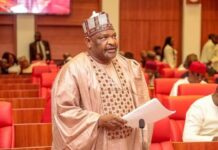
World Humanitarian Day (WHD) is held every year on 19 August to pay tribute to aid workers who risk their lives in humanitarian service, and to mobilize people to advocate for a more humane world because every day, people affected by crisis face impossible choice that jeopardize their health, safety and dignity. According to IOM’s Displacement Tracking Matrix (DTM Round 10 of June, 2016), an estimated 2.07 million people in total are internally displaced in 12 states and Abuja in Nigeria. Among those people, there are 1.7 million internally displaced persons (IDPs) only in Adamawa, Borno, Gombe and Yobe. 87.5% of the total IDPs population has been displaced as a direct result of the insurgency. The remaining IDPs are due to intercommunity clashes. The largest proportion of these IDPs are located in Borno State (1.4 million), followed by Adamawa (159,445) and Yobe (112,671). The majority of IDPs (86 %) live in host communities while the remaining 14% live in IDP camps. Female IDPs represent 53% of the displaced population while 55% of IDPs are less than 18 years old.
Some key achievements (October 2014 – June 2016)
UNFPA Nigeria Country Office (CO) initiated its humanitarian response for the Boko Haram conflict affected population in late 2013 in Borno and Adamawa States. The response reached about 2.6 million people since October 2014 and UNFPA plans to expand to about 4.5 million people in 2016 to include Internally Displaced Persons (IDPs), returnees and women and girls in recently liberated local government areas and communities. Since the beginning of this year, people reached through different interventions, are estimated at 960,000 people. The capacity of 218 frontline health workers from Borno, Adamawa and Gombe States have been developed according to standards set in the Minimum initial services package for reproductive health in humanitarian settings (MISP) for reproductive health in emergency settings. Moreover, 396 prioritized health facilities and 9 IDPs camps in Adamawa, Borno, Gombe and Yobe States were serviced for 12 months with several categories of Reproductive Health (RH) kits.
26,000 female dignity kits were procured and distributed to vulnerable women and girls in IDP camps and host communities in the targeted areas. 87,910 pregnant women received clean and safe delivery kits to enhance safe delivery. 1,145,108 men and young boys and 3,139 women and young girls accessed male and female condoms and other services respectively. 2,500 survivors of GBV cases were successfully managed and treated for sexual transmitted disease and other complication. 421 women used long and reversible contraceptives (LARC) provided through 119 health workers trained on LARC technology on active management of third state of labour. 100 health workers and social workers were trained on basic and advanced psychosocial support services and they have reached over 108,000 with services including referral. Survivors from GBV and traumatized persons from the insurgency benefited from culturally appropriate psychosocial services.
UNFPA Nigeria Humanitarian Unit have resolved to work alongside partners in the delivery of humanitarian assistance in the Northeast by ensuring every pregnancy is wanted, every childbirth is safe and every young person’s potential is fulfilled. Despite the attack there has been no interruption of humanitarian services to the communities in the four affected states. Our challenges are great, but our commitment to serve the people who are so desperate for reproductive health services and access to basic health services remains stronger than ever
























